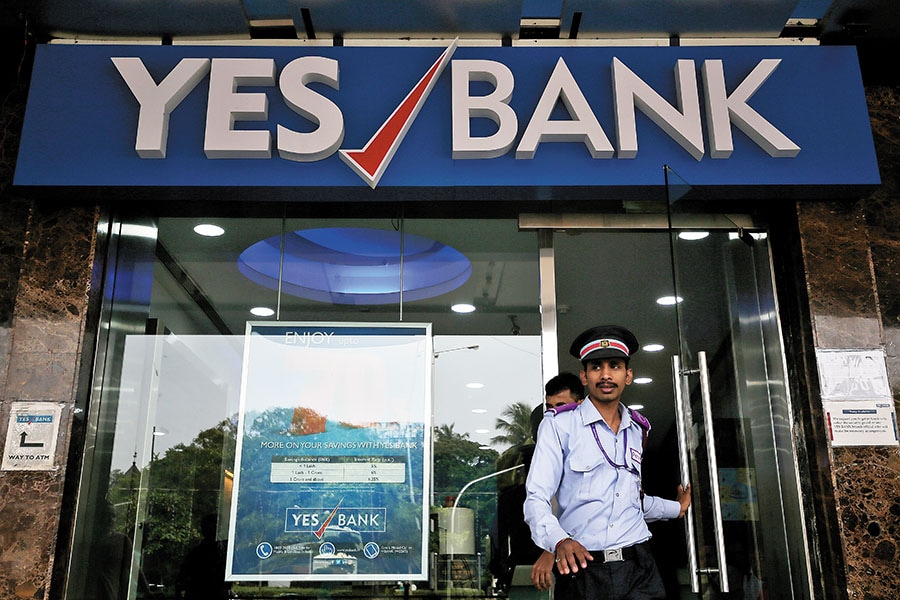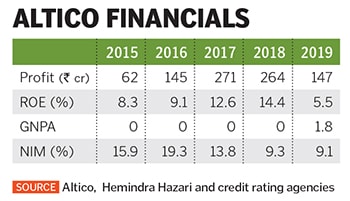The Altico mess and pain for Yes Bank
Altico Capital's default could put more pressure on the bank's balance sheet and lead to greater scrutiny


 Image: Francis Mascarenhas / Reuters[br]Bad news surrounding Yes Bank doesn’t seem to stop. In September, the default of unlisted NBFC Altico Capital for ₹19.97 crore of interest income on an external commercial borrowing of ₹340 crore from UAE-based Mashreq Bank led to a ratings downgrade by various agencies. According to an India Ratings note, Yes Bank has a ₹450 crore exposure to Altico.
Image: Francis Mascarenhas / Reuters[br]Bad news surrounding Yes Bank doesn’t seem to stop. In September, the default of unlisted NBFC Altico Capital for ₹19.97 crore of interest income on an external commercial borrowing of ₹340 crore from UAE-based Mashreq Bank led to a ratings downgrade by various agencies. According to an India Ratings note, Yes Bank has a ₹450 crore exposure to Altico.
Several other banks—including State Bank of India (₹363 crore), HDFC Bank (₹280 crore) Bank of Baroda (Rs 278 crore) also have an exposure to Altico. Mashreq Bank has the highest exposure for a total of Rs 660 crore.
But this is not the first time that Yes Bank has come into the limelight for its exposure to companies which were fraud-hit such as CG Power or to debt-laden companies such as DHFL and full carrier Jet Airways, which shut operations in April.
Yes Bank, in its latest investor presentation ended June 30, 2019, said that net non-performing assets stood at 2.91 percent at ₹6,883 crore. Gross slippages were for ₹6,200 crore in the same quarter, where net corporate slippages were entirely from the accounts classified as BB and below at end of March 2019.
The bank has a contingent provision of around ₹700 crore as on June 30, 2019, which continue to impact earnings.But investors have been ruthless on the Yes Bank stock—falling 80 percent to ₹55.90 at the BSE on September 25, from a high of ₹280 in April this year. Concerns over corporate governance and exposure to the commercial real estate which continues to slow down and impact in asset quality are hurting the bank.
In an unrelated development, Yes Bank founder Rana Kapoor is considering selling stakes of his family-owned stakes in Yes Bank to Paytm, in a bid to repay dues. There are reports that Kapoor is in talks with Paytm founder Vijay Shekhar Sharma, who also controls the Paytm Payments Bank RBI norms say that a promoter cannot control two banks.
This deal is unlikely to go through, which automatically means that the scrutiny on Kapoor and Yes Bank is unlikely to diminish.
As far as Altico is concerned, the company has sought more time from lenders and investors to devise a plan to meet its debt obligations. The initial plan of the NBFC was to sell some assets which would help it to infuse fresh funds from new shareholders.
Altico’s chairperson Naina Lal Kidwai, who had 14 committee and board meetings over the past 60 days, has quit from her post, citing “the burden impossible to keep up”.
“It is apparent that either Altico’s strategy of concentrated lending to high-risk real estate developers had the board’s full support or they were ignorant of it,” says Hemindra Hazari, an independent banking analyst who publishes his writings on Singapore-based research platform Smartkarma.
Hazari says the lesson from Altico"s default is loud and clear: Companies’ financial accounts and the senior management commentary maybe misleading and excessively optimistic.
This could put more pressure on Yes Bank’s balance sheet. It also indicates the incompetence of credit ratings agencies.
First Published: Sep 24, 2019, 12:00
Subscribe Now